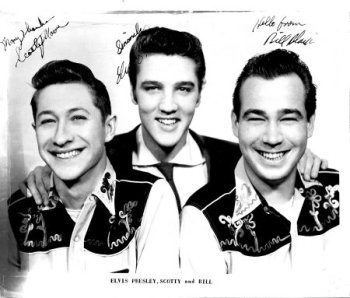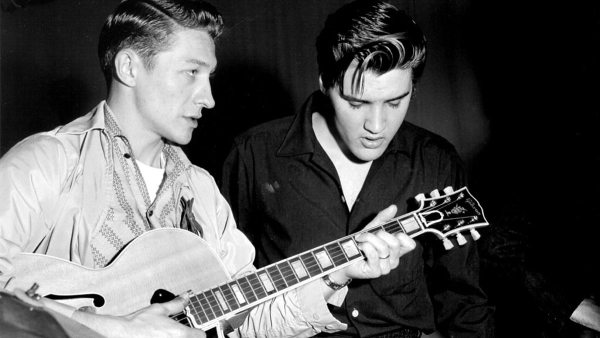NEW YORK TIMES: Scotty Moore, a guitarist whose terse, bluesy licks on Elvis Presley’s early hits virtually created the rockabilly guitar style and established the guitar as a lead instrument in rock ’n’ roll, died on Tuesday at his home outside Nashville. He was 84. In 1954, Mr. Moore was performing with a country group, Doug Poindexter and the Starlite Wranglers, and recording at Sun Records in Memphis when Sam Phillips, the label’s owner, asked him to audition a young singer that his secretary kept mentioning. On July 4, Presley showed up at Mr. Moore’s house. Bill Black, the bass player for the Starlite Wranglers, arrived soon after, and the three men began running through a random selection of songs. Mr. Moore was not overly impressed but told Phillips that the young fellow had a nice voice and might be worth a try. The next evening, at Sun studio, the trio recorded an up-tempo version of “That’s All Right,” a blues song by Arthur Crudup, known as Big Boy, that Sun released with a rockabilly version of “Blue Moon of Kentucky” on the flip side. The record caught fire locally, and Presley was on his way, electrifying audiences with a new sound defined in large part by Mr. Moore, whose slashing chords, inserted like musical punctuation, and hard-driving solos inspired future rock guitarists around the world, including Keith Richards, George Harrison, Jeff Beck, Mark Knopfler and Chris Isaak. “All I wanted to do in the world was to be able to play and sound like that,” Mr. Richards told Mr. Dickerson, who helped Mr. Moore write the 1997 memoir “That’s Alright, Elvis.” He added: “Everyone else wanted to be Elvis. I wanted to be Scotty.” MORE
LOS ANGELES: Moore was a local session musician when he and Black were thrown together with Presley on July 5, 1954, in the Memphis-based Sun Records studios. Presley was a self-effacing but determined teen anxious to make a record. Moore’s bright riffs and fluid solos — natural compliments to Presley’s strumming rhythm guitar — and Black’s hard-slapping work on a standup bass gave Elvis the foundation on which he developed a fresh blend of blues, gospel and country that came  to be called rock ‘n’ roll. “One day, we went to have coffee with Sam and his secretary, Marion Keisker, and she was the one who brought up Elvis,” Moore said in a 2014 interview with Guitar Player magazine. “We didn’t know, but Marion had a crush on Elvis, and she asked Sam if he had ever talked to that boy who had been in there.
to be called rock ‘n’ roll. “One day, we went to have coffee with Sam and his secretary, Marion Keisker, and she was the one who brought up Elvis,” Moore said in a 2014 interview with Guitar Player magazine. “We didn’t know, but Marion had a crush on Elvis, and she asked Sam if he had ever talked to that boy who had been in there.
“Sam said to Marion, `Go back in there and get that boy’s telephone number, and give it to Scotty.’ Then, Sam turned to me and said, `Why don’t you listen to this boy, and see what you think.’ Marion came back with a slip of paper, and it said ‘Elvis Presley.’ I said, ‘Elvis Presley — what the hell kind of a name is that?’” For the now-legendary Sun sessions they covered a wide range of songs, from “That’s All Right” to “Mystery Train.” After “That’s All Right” began drawing attention, Presley, Moore and Black took to the road playing any gig they could find, large or small, adding drummer D.J. Fontana and trying their best to be heard over thousands of screaming fans. […]
Moore, Black and Fontana backed Presley for his TV appearances and early movies, but by 1957 had tired of what Moore called “Elvis economics.” In the memoir “That’s Alright, Elvis,” published in 1997, Moore noted that he earned just over $8,000 in 1956, while Presley became a millionaire. Moore also cited tension with Elvis’ manager, “Colonel” Tom Parker. “We couldn’t go talk to Elvis and talk about anything,” Moore, who along with Black left Presley’s group, told Nashville’s Tennessean newspaper in 1997. “There wasn’t ever any privacy. It was designed that way, but not by Elvis. It’s not that I feel bitterness, just disappointment.” Moore worked one more time with Presley, for the 1968 “comeback” TV special that helped return him to the top of the charts. But Moore’s compensation didn’t even cover his travel expenses, he would recall, and he was not asked to join Presley’s band for his tours in the 1970s. (Presley died in 1977). MORE

